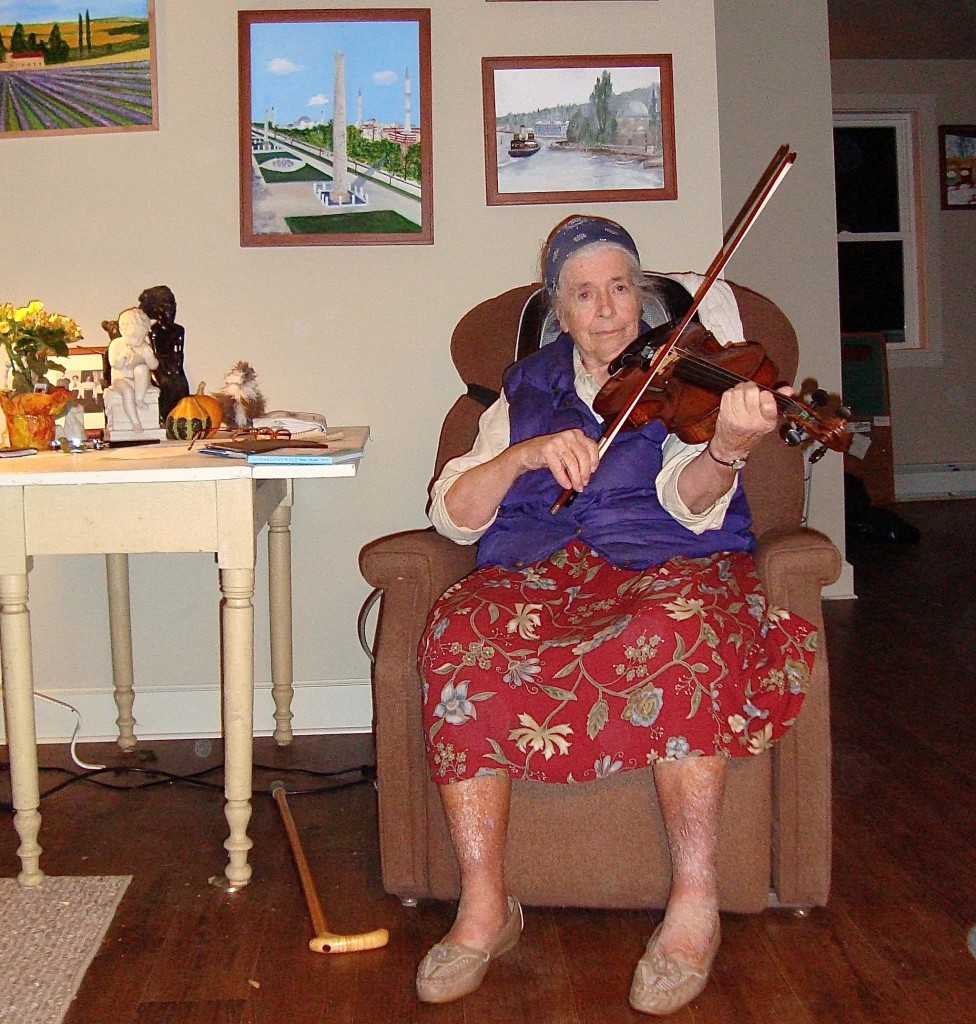by Beth Whitman
Throughout my life, routine daily activities have been accompanied by the music of my mother’s singing and humming. Sometimes her humming was under her breath and sometimes she would be singing a song in her clear and beautiful soprano voice. There are many songs I know simply because Mom has sung them throughout my life.
Du Du Liecht Mir Mir Hertzen
Du, du Liecht Mir Mit Zin.
Du, do mein mir
Da daa, d da da, d daa.
I don’t think Mom ever sang the end of that song. It always devolved into da, da, da.
Some of the songs I know because Mom introduced them to us in other ways. The Swingle Singers was a group that Mom was crazy about when we were growing up. She had a number of their albums and often played them, but her favorite song of theirs was “Bach’s Prelude Chorale.” When she was particularly happy, she would often hum the Prelude Chorale.
do DOO . . . doobie doobie doobie doobie doobie doo,
Doobie doobie doobie doobie doobie do DOO.
And then there were the old standards from the Gilbert and Sullivan musicals from the days when Mom was in the orchestra pit. She played the viola, and wherever we lived, Mom was a member of the local orchestra or played in string quartets with other musicians she met through the orchestra. I used to spend hours after school in the empty auditoriums listening to the cast rehearse.
I am the very model of a modern major general . . .
By the time I had finished elementary school, we all knew the words to many of the Gilbert and Sullivan musicals by heart.
I’ve information: veg-e-ta-ble, animal, and mineral,
I quote the kings of England and I quote the facts historical . . .
We knew Mom was happy when she was humming or singing. But as her Alzhiemer’s progressed, Mom slowly stopped singing the actual tunes. One of the ways I tracked the progress of her memory loss was in how her humming and singing changed. And also how less and less frequently she would pick up the viola to practice.
By the time Mom moved in with me, she rarely sang the words to Gilbert and Sullivan anymore. But she would still hum a tune under her breath.
She had a songbook that she often opened up, and even after she stopped reading the words of the songs, she would study the notes and slowly make out a tune that she would suddenly recognize. One day I came upon her, seeing her focused intently on the page with her finger next to the first note.
“Da . . .” Her finger moved and her voice went a note lower. “Da . . .” And then even lower. “Da . . .“
Just as I realized she was actually reading the music, she realized that she knew the song, and so I joined in singing. It was the National Anthem! We started again, leading her back to her memory of the words. Her eyes lit up as she remembered the words and sang along with me.
“O say can you see . . .“
Dad joined in with us as well.
“By the dawn’s early light . . .“
The three of us sang the whole song through at the top of our lungs. And then we burst out laughing. It felt like a reunion of memories.
The tunes Mom hummed became more and more limited, until all that she was humming were two notes over and over again. I found that when she was starting to get upset about something, if I sang one of those old familiar songs she used to hum and sing, it would bring her away from her disquiet and distract her into a happy memory.
But slowly, slowly, she was going silent.
As things progressed even further, I would often play a classical music CD to soothe her, and occasionally she would still pull out her viola and try to pluck the strings and play a scale. It would take a while for her to figure out where her fingers should go — something that came so naturally to her for the many years before Alzheimer’s. And when she found the right placement, she would quietly pluck out the scales over and over again, sometimes for an hour or two.
And then eventually she just stopped.
I pulled the viola out one last time shortly before she went into the Alzheimer’s facility. She reached out and held it lovingly for a while.
And then she shook her head and handed it back to me.
Beth Whitman lives in Maine and is a member of Belfast Cohousing and Ecovillage, a developing community on the coast of Maine focused on multigenerational living and sustainability.
Originally posted on July 9, 2013.
Tags: Alzheimer's, how to maintain connection with alzheimer's patient







Thanks for sharing your thoughts on a daughter\’s journal.
Regards
Thank you so much for sharing your heart warming story.
I have cared for those with Alzheimer’s and their love of music seems to be the last to go. Your dear mother is very fortunate to have you in her life at this special time. You are the Silver Lining.
Best Wishes, Mary Jo